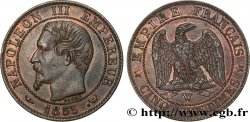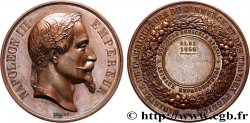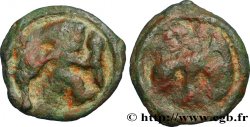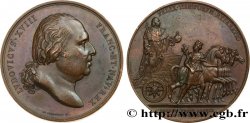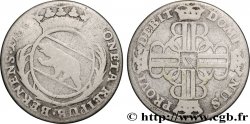MONNAIES 23 (2004)
Начальная цена : 900.00 €
Назначить цену : 1 500.00 €
непроданный лот
Начальная цена : 900.00 €
Назначить цену : 1 500.00 €
непроданный лот
Тип Module de 5 francs "Finis Germaniæ" en argent
Дата: 1870
Монетный двор / Город: Bruxelles
Металл: silver
Диаметр: 36,8 mm
Ориентация осей монеты: 6 h.
Вес: 18,84 g.
Век: cannelée
Редкость: R1
Комментарии о состоянии
On note d’infimes traces de cheveux ou “hair lines” sur cet exemplaire. Le brillant d’origine et le velours de frappe sont présents. Le buste de l’Empereur est mat ainsi que la couronne au revers et donnent un aspect “camée” à cet exemplaire
Лицевая сторона
Аверс: легенда: NEAPOLIO III - IMPERATOR.
Аверс: описание: Tête laurée de Napoléon III à gauche.
Обратная сторона
Реверс: легенда: FINIS/ GERMANIÆ/ 1870 .
Реверс: Описание: dans une couronne composite formée d'une branche d'olivier et d'une branche de chêne.
Комментарий
Cette monnaie, considérée à tort par les non latinistes comme une monnaie satirique, est en réalité un essai monétaire flagorneur frappé avant la défaite ; "Finis Germaniæ" est une invocation à la défaite teutonne. En l'absence de différent et avec une latinisation incongrue du nom de l'Empereur, on peut supposer l'auteur d'être Charles Wurden, de Bruxelles, qui se distinguera ultérieurement par sa série de Napoléon IV.
This coin, wrongly considered by non-Latinists as a satirical coin, is in reality a sycophantic monetary experiment struck before the defeat; \\\"Finis Germaniæ\\\" is an invocation to the Teutonic defeat. In the absence of a different and with an incongruous Latinization of the Emperor's name, we can assume the author to be Charles Wurden, from Brussels, who would later distinguish himself with his Napoleon IV series.
This coin, wrongly considered by non-Latinists as a satirical coin, is in reality a sycophantic monetary experiment struck before the defeat; \\\"Finis Germaniæ\\\" is an invocation to the Teutonic defeat. In the absence of a different and with an incongruous Latinization of the Emperor's name, we can assume the author to be Charles Wurden, from Brussels, who would later distinguish himself with his Napoleon IV series.








 Cообщить об ошибке
Cообщить об ошибке Распечатать страницу
Распечатать страницу Отправить мой выбор
Отправить мой выбор Задать вопрос
Задать вопрос Consign / sell
Consign / sell
 Информация
Информация